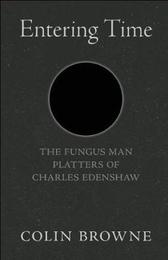
|
Entering Time: The Fungus Man Platters of Charles Edenshaw
Paperback / softback
Main Details
| Title |
Entering Time: The Fungus Man Platters of Charles Edenshaw
|
| Authors and Contributors |
By (author) Colin Browne
|
| Physical Properties |
| Format:Paperback / softback | | Pages:192 | | Dimensions(mm): Height 215,Width 139 |
|
| Category/Genre | Art of indigenous peoples |
|---|
| ISBN/Barcode |
9781772010398
|
| Classifications | Dewey:704.039728 |
|---|
| Audience | |
|---|
| Illustrations |
B&W photos
|
|
Publishing Details |
| Publisher |
Talon Books,Canada
|
| Imprint |
Talon Books,Canada
|
| Publication Date |
16 February 2017 |
| Publication Country |
Canada
|
Description
During the groundbreaking Charles Edenshaw exhibition at the Vancouver Art Gallery in 2013, poet Colin Browne found himself returning often to study three large argillite platters carved by the Haida master in the late 1800s. Produced several years apart, each depicts an identical scene at the same moment: two frightened figures in a canoe appear to be on a mission. One is the Raven, in supernatural form, brandishing a spear; the other, in the stern, is a human-like figure with a circular head. On one platter he holds a paddle; on the other, his arms are raised in a state of panic. He is the helmsman, known as Fungus, or Fungus Man, or Biscuit Man. The Raven and Fungus Man appear early on in the Haida epic poem "Raven Travelling," not long after the Raven releases human men from a clamshell. Their mission is to enable men and women to go forth and multiply. The three platters, celebrated not only for their craftsmanship but also for their insight into the psyche, are rarely brought together in one place, and the fact that Edenshaw returned, with a sense of humour, to this primal scene, suggests that the theme was as important to him as it was to his contemporary, Sigmund Freud. Browne launches his unexpected journey of discovery with a simple question: "Who was Fungus, or Fungus Man, and why did he become the one responsible for the miracle of human procreation?" Every good story is an origin story - and a mystery story - and in Entering Time: The Fungus Man Platters of Charles Edenshaw, Browne ranges through the fields of art history, literature, ethnology, and myth to discover a parallel history of modernism within one of the world's most subtle and sophisticated artistic and literary cultures. The text is supplemented by an interview with visual artist Neil Campbell, whose recent paintings speak to Fungus Man's art-historical echoes and contemporary relevance.
Author Biography
Colin Browne: Colin Browne is the author of Abraham (Brick Books, 1987); the critically acclaimed collection of poetry Ground Water (Talonbooks, 2002), which was nominated for a Governor General's Literary Award and a Dorothy Livesay Poetry Prize; and The Shovel (Talonbooks, 2007), shortlisted for the 2008 ReLit Award. He was an editor of Writing magazine and co-founder of the Kootenay School of Writing, the Praxis Centre for Screenwriters, and the Art of Documentary workshops. Browne's films include Linton Garner: I Never Said Goodbye (2003), Father and Son (1992) and White Lake (1989), which was nominated for a Genie for Best Feature Length Documentary. He is currently working on texts for new operas. His recent work explores the history and legacy of the Surrealist fascination with the art of the Northwest Coast and Alaska, and includes the essay "Scavengers of Paradise." Browne has recently retired from teaching production, screenwriting, and film history at Simon Fraser University's School for the Contemporary Arts. Neil Campbell: Neil Campbell is a contemporary artist who grew up as a third-generation Irish-Canadian on a Saskatchewan farm. He lives in Vancouver.
Reviews"Colin Browne provides a thoughtful, provocative analysis of Charles Edenshaw's depictions of Raven's journey to help fulfill women, and in doing so, contemplates humanity's existence."-Gid7ahl-Gudsllaay, Lalaxaaygans, Terri-Lynn Williams-Davidson~||~ "Browne's masterful drawing-together of ... sources, his astute observations, creative speculations, and poetic writing combine to give a new perspective on three masterpieces of Haida art."-Martha Black, BC Studies~||~ "With a passion that is contagious, Colin Browne leads readers across the realms of epic poem, oral narrative, science, art, and detective story as he pursues Raven and his helmsman - the mysterious Fungus Man - on an enthralling journey into time and history."-Karen Duffek, co-author of The Transforming Image "Colin Browne provides a thoughtful, provocative analysis of Charles Edenshaw's depictions of Raven's journey to help fulfill women, and in doing so, contemplates humanity's existence."-Gid7ahl-Gudsllaay, Lalaxaaygans, Terri-Lynn Williams-Davidson "[Browne] is to be congratulated on treating Edenshaw's work not as a separate 'ethnographic' art but as modernist hybrid work that mirrored what was going on in the Haida world in late nineteenth and early twentieth century B.C. Browne's detailed discussion of Charles Edenshaw's platters - and the political, social, and economic environment in which that creation took place - is informed by his dependence on the knowledge and insight of contemporary Haida scholars and artists and also by his extensive reference to academic discussion. ... A delight to read and an accessible and lively introduction to the twists and turns of Haida mythology." -The Ormsby Review
|